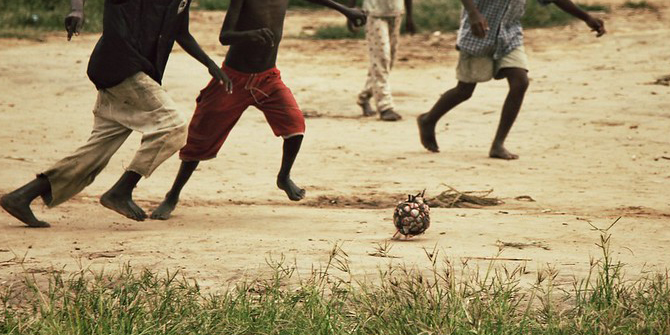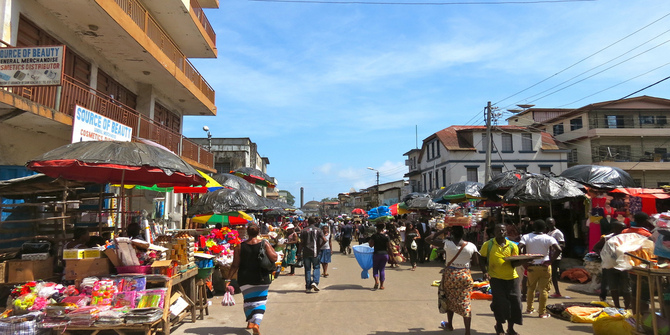The LSE Africa Summit 2021 challenged the notion that the COVID-19 pandemic constitutes the primary global crisis, instead presenting a more complicated picture of issues long-overlooked and interconnected. The Summit’s Speakers and Content team present their most memorable insights from the year’s prestigious event, highlighting the importance of grassroots and local initiatives in Africa for meaningful and impactful change.
The Global Crisis as a Catalyst for Change
Given events of the last year, the responsibility to bring the LSE Africa Summit to fruition is not a responsibility taken lightly. For the 2021 Summit, we knew that the omnipresence of COVID-19 could not be sidestepped, and yet we collectively asked: can we structure a two-day conference without explicitly focusing on the pandemic?
After all, the pandemic exposed and contributed to existing challenges across Africa, while amplifying the need to address them. Notably throughout 2020 we witnessed a breakout of grassroots movements across the continent, from #EndSARS demonstrations seeking to prevent police brutality in Nigeria to the #ShutItAllDown protests about gender-based violence in Namibia. Coupled with wider questions surrounding African identities (particularly after the global wave of Black Lives Matter demonstrations), as well as climate threats, it became clear the pandemic was a conduit to tackle underlying political, socio-economic and environmental struggles.
Given the importance of these movements, and the opportunities such a significant world event afforded, we set about enacting our vision for the Summit: The Global Crisis as a Catalyst for Change.
Jonathan Terrefe – Change is not a cost, it’s an investment
While listening to Lady Phyll’s opening keynote address, I was reminded to question what the global crisis in the African context actually is: ‘Is the global crisis defined by racism, misogyny, misogynoir? … the crisis is not one, it is many.’ Above all, Lady Phyll insisted we consider ‘the crisis of the human heart.’ By placing the pandemic within broader conversations on longstanding threats and injustices, we are forced to ask what these crises mean for catalysing change on the African continent, and the form such change should take. If we want to begin to address these different crises, we must realise that change starts with challenging and recognising our individual and grassroots potential.
Indeed action at the grassroots level cut across the discussions. On the issue of how Africa can recover and emerge from the pandemic, Dr Lucy Kanya explained that in healthcare ‘we really need community-based solutions, which will have [a] greater impact than focusing on hospital-based [solutions]’. Given that more people on the continent have died from curable diseases such as diarrheal problems than the COVID-19 pandemic, Dr Kanya emphasised the need for ‘low-cost solutions and, above all, priority-based solutions on needs-driven interventions’. As a result, we must view healthcare as an investment in people, not a cost. The point was reaffirmed by Dr Ola Brown: healthcare is an ‘investment we cannot afford to not make’.
This bottom-up approach aligns with calls for climate action, where African voices on global climate agendas have long been marginalised by the most dominant actors who frame the issues. Dr Mwenda, Executive Director of the Pan-African Climate Justice Alliance (PACJA), leads a consortium with more than 1,000 member organisations across 48 countries, exchanging resources and knowledge to work towards a more climate-just future: ‘When you sit in [climate] negotiations, you realise there are few Africans. Where do we sit now to shape the narrative?’ The local level is where we can make a difference through community-based organisations and partnerships. Ultimately, it will be difficult to catalyse any change if people are not at the core of the agenda.
Moving forward, regardless of how we label the global crisis, whether we interpret it as the COVID-19 pandemic, intensifying climate challenges or a ‘crisis of the human heart’, we must demand more from ourselves on a daily basis – and in addressing these issues, we must acknowledge our actions as investments rather than costs.
Aaliyah Vayez – The work is just beginning
I was privileged to moderate the ‘Decolonising Identities’ dialogue between Professor Sabelo J. Ndlovu-Gatsheni and Dr Althea-Maria Rivas, addressing pressing issues concerning the decolonial project: what should be decolonised, why this should be done and what process should take place. Each speaker tackled the topic with well-informed optimism, accompanied by reflections on literary contributions by authors such as Frantz Fanon and Steve Biko, and their identity as Africans and positionality within institutions of higher education.
The speakers began by considering the statement: ‘Africa is born in me, I am constructing it.’ By framing the discourse on African identity as increasingly existential rather than intellectual, the notion of an African identity and the process by which it is created and embodied was made highly personal. Thinking beyond ourselves, we were challenged to consider African identity as a product of a continent-wide process of construction, thereby making our identity (collective or individual) a product of one another. This echoed the well-known principle of Ubuntu (I am, because you are) and suggested pan-Africanism as perhaps first and foremost a form of African nationalism.
Speakers on our panel ‘Womanhood: Representation, Participation and Leadership’ included Seeham Samaai, Dr Stella Nyanzi, Buhle Ngaba and Dr Wunpini Fatimata Mohammed. Making great strides to advance the position of women across their fields, they moved from historical notions of feminism and the place of women in African development to the importance of unity across space, time and intersectional struggles. As a South African woman, the phrase ‘Wathint’ abafazi wathinti’ imbokodo’ (You strike a woman, you strike a rock) is no stranger to me. However, a pan-African panel that emphasised the recognition of queer and trans people, too, continues to redefine the boundaries of African womanhood – and how it translates to personhood.
Following a public call on social media, submissions of poetry, photography, documentaries, paintings and more were exhibited in the ‘Art of the Revolution’ sessions. As the audience responded to their interpretation of the works, I realised that the Summit and its truly pan-African teamwork encompassed the agency of Africans to self-define the complexities and intersections of their past, present and future. As a team, moreover, we navigated our own understandings of African-ness as we crafted the Summit from start to finish. I leave this project knowing that the work of imagining the African I want to be and the Africa I want to contribute to has only just begun.
Maxine Thomas-Asante – Our voices and core values
My fondest memory of our five months preparing for the Summit were our numerous planning meetings. We envisioned an event that welcomed people outside of academia, amplified the voices of those on the continent and inspired practical collaboration beyond the Summit. I am proud to say that what we produced, though not perfect, achieved much of the vision we initially intended.
I was most concerned about how to democratise access to the event from our position of privilege in an elite British university in the heart of London. We discussed ways of making the event free, advertising through alternative means and collaborating with organisations on the continent. While the Firoz Lalji Centre for Africa had useful contacts with research organisations, we were stretched on how to reach people on the continent outside of education institutions or corporations.
We also had to ask ourselves what personal privileges we embodied in this process. As a Black British person of Ghanaian and Jamaican descent, I felt inspired using my labour to create this event. It was important to consider where best to use my voice in the forefront and where best to amplify the voices of those living on the continent to disrupt these dynamics of privilege.
My favourite quote emerging from the event was by Professor Sabelo J Ndlovu-Gatsheni in the Decolonising African Identities session:
‘The mistaken problem [is] always thinking about decolonisation as going back … There is no back … to go back to. The issue is how to think through these processes, as painful as they are, what type of African identity do we want to produce?’
I was reminded that while reflexivity is incredibly important, we should not let this debilitate our imagination of what African identities, experiences and futures could look like. The future is ours to share and shape.
Elise El Nouchi – Interacting to bridge our individualities
Learning, interacting, building together. All these things were reunited in the process of preparing the LSE Africa Summit 2021.
When reflecting on the whole process from conceptualisation to the event itself, I was reminded of how impactful and strong social interactions and ties can be, especially during the COVID-19 pandemic. We wanted to adapt this year to make the Summit accessible to as many people as possible. We aimed at creating a safe space where people could share, learn and mobilise in order to build a better future collectively. As a result, inclusivity was at the centre of what we sought to achieve during our journey.
While doing so, I must say that I grew. I am certain that it is thanks to the people surrounding me, my team members, but also the very powerful speeches and discourses that we had the privilege of witnessing. They made me question my own identity and positionality. They made me understand the nature of the change I hope to make in the world, while making me realise that any change first needs to happen from the ground up.
No matter where we are, irrespective of time differences, and regardless of our individualities, when visions and beliefs are strong enough, we can build the necessary bridges to make impactful change. In the words of Hauwa Ibrahim, ‘we must stop crawling and start flying’.
If you have any reflections, please do share them with us on social media using the hashtag #LSEAfricaSummit21. For those who did attend the event, we cannot thank you enough for your incredible support and you can view recordings from the Summit here. We hope you were inspired to consider the LSE Africa Summit 2021 as a call for action.
Photo: COVID-19 testing. April 3, 2020. Madagascar. Photo: World Bank / Henitsoa Rafalia. Licensed under CC BY-NC-ND 2.0.





